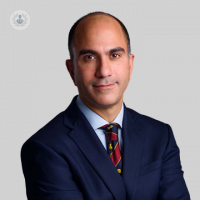How can a loss of sense of smell be treated?
Written by:In one of our latest articles here below, Mr Vikram Dhar, a highly reputable consultant ENT and head and neck surgeon, provides us with an intriguing and insightful guide on anosmia, including the condition’s main causes.

What is anosmia?
It is simply the loss of perception of the sense of smell.
What causes it? Is it linked to COVID-19?
It was a fairly unthought about condition before COVID-19 came along. Interestingly, it was one of the first markers that brought the scientific community into understanding where COVID-19, and all of a sudden, there was a huge increase in Google searches. It was certainly thought that the COVID-19 outbreak was related to losing one’s sense of smell.
COVID-19 is not the only reason why people lose their sense of smell. There are two broad categories for losing a sense of smell: one is the smell molecules are simply not getting through the nose to the skull base, which is what we refer to as a conductive loss of smell.
The second one is a sensor neuron loss of sense of smell, where the nerve for smell is no longer working, or there is a condition further up towards the brain that is causing this loss of sense of smell. The cause of this is usually a virus.
How long does it last for? Can it be permanent?
If it is a conductive loss of sense of smell, then often the nasal polyps (the likely cause) can be reduced with either medication or surgery. Therefore, the smell molecules can rise through the nose again and the sense of smell can return.
For the other causes (COVID-19 or other viruses), it is unknown if and when the loss of sense of smell will come back. There are certain treatments that can help, but in essence, time will tell whether or not it will come back.
How is it treated?
The most common cause of anosmia is COVID-19. It has been suggested through research that omega 3 is advised when it comes to treating loss of smell. Another thing that is very useful tool is ABSCENT.ORG where there are lots of excellent information available, including being able to access smell retraining kits. Smell retraining therapy works on about buying into the idea of relearning what certain smells should smell like.
How can people manage anosmia? What ways can they improve their quality of life?
I think seeing an ENT surgeon is very useful as you can get a definitive diagnosis.
Mr Vikram Dhar is a highly accomplished consultant ENT and head and neck surgeon who specialises in sinusitis and loss of sense of smell. If you have noticed a loss of sense of smell recently, make sure to book a consultation with Mr Dhar today. You can do just that via his Top Doctors profile.


